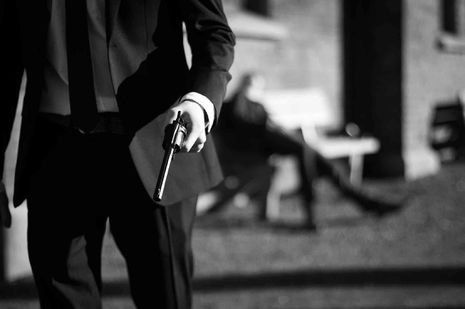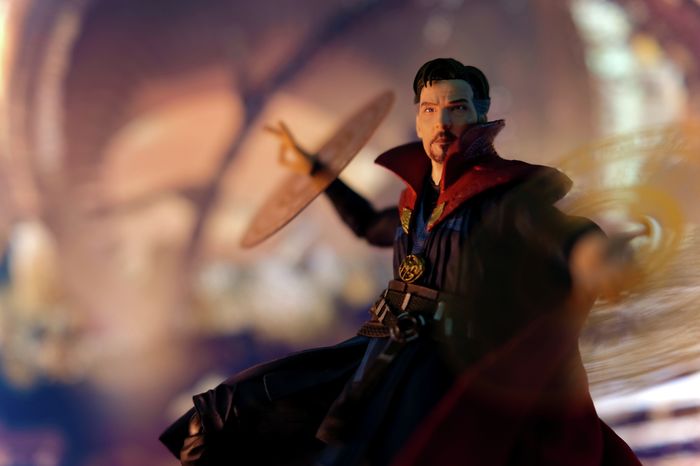Hidden Gems: Kiss Kiss, Bang Bang
In this crossover between the ‘Hidden Gems’ series and his column ‘Key Takes’, Ryan Keys says Shane Black’s ironic deep-dive into the dark world of film noir deserves more time in the spotlight

It’s hard to imagine a time when Robert Downey Jr. — now the face of the biggest movie franchise in the world — could walk into an audition room as an underdog. But in 2004, he did just that. After a very public battle with addiction, Downey Jr.’s career came to a halt in 2001 when he was fired from Ally McBeal following a series of drug charges. It was his now-wife, née Susan Levin, who convinced him to audition for Kiss Kiss, Bang Bang, which her colleague Joel Silver was producing. Against the odds, Downey Jr. got the part, and his turn as the film’s sardonic protagonist (and part-time narrator) caught the eye of Iron Man director Jon Favreau. The rest, as they say, is history.
“This film is a sarcastic love letter to film noir”
Despite its role in the miraculous resurgence of Downey Jr.’s career — not to mention a standing ovation at the 2005 Cannes Film Festival — Kiss Kiss, Bang Bang didn’t enjoy much commercial success, only just breaking even on its $15 million budget. Nevertheless, Downey Jr. has called it ‘the best film [he’s] ever done’, and many Shane Black fans (myself included) maintain that it is some of his best work — high praise indeed for the man who also gave us Lethal Weapon (1987), The Last Boy Scout (1991), and The Long Kiss Goodnight (1996).
Kiss Kiss, Bang Bang is about as meta as it gets: its very title comes from esteemed film critic Pauline Kael, who saw the phrase on an Italian film poster and seized on it as a sad indictment of the shallow appeal of modern cinema. Things only get more self-referential from here. The fourth wall is entirely absent as our protagonist Harry Lockhart (Downey Jr.) pauses and rewinds the movie at will to offer ironic exposition and snarky insights with the air of an eccentric film school professor on his last day at the job. This film is a sarcastic love letter to film noir which hits every trope with its tongue firmly in cheek; its convoluted plot of mistaken identity and murder is punctuated by car chases, shootouts, and a hilariously-botched homage to the Russian roulette scene in L. A. Confidential (1997).
“Remarkably, this paint-by-numbers noir plot never gets boring”
What is remarkable about this film is that, even though it hits these clichés to make fun of them, you nevertheless find yourself enthralled in its plot, even if you can’t exactly follow it. This is largely thanks to Black’s incredible script, which dishes out one-liners and belly laughs at a rate that is tough to keep up with. The wit of the screenplay is brought to life by the formidable lead trio of Downey Jr., Val Kilmer, and Michelle Monaghan, whose uneasy partnership is brimming with chemistry. Kilmer plays ‘Gay Perry’, the real private eye charged with educating accidental actor Harry on the ins and outs of the industry (it’s a long story).
The two form one of the greatest odd couples to grace the big screen, with Harry’s bumbling attempts to be a proper P. I. provoking the endless exasperation of suave, no-nonsense badass Perry. Monaghan plays Harry’s high-school sweetheart, Harmony, who came to Hollywood with dreams of being a star with about as much success as you’d expect. Before long, the three of them find themselves embroiled in a Chandler-esque plot of crime and corruption after Harmony’s sister is mysteriously murdered. As you’d expect, this leads them deep into the sleazy heart of Hollywood, as they are pitted against mobsters and hired assassins and… you get the picture.
“A Chandler-esque plot of crime and corruption”
Remarkably, this paint-by-numbers noir plot never gets boring. In fact, its many action set pieces are genuinely thrilling (this is the guy who gave us Lethal Weapon after all), and it also has its share of hilariously violent mishaps which could’ve come straight from the playbook of Tarantino. You won’t come away from this movie raving about the genius of its convoluted narrative, but you will leave with a smile on your face and the joyful memory of some of its more ridiculous moments.
Sadly, despite its gesture to a sequel in its closing scene, Kiss Kiss, Bang Bang is — and will most likely remain — the one and only outing for Harry, Perry and Harmony. The closest we have is The Nice Guys (2016), in many ways the spiritual successor to Kiss Kiss, Bang Bang and another high point of Black’s filmography. But this movie is more than capable of standing on its own, and the fact that it never got that sequel makes it that bit more special. As Perry says in its final moment: ’That’s it… and for all you good people in the Midwest, sorry we said ‘f**k’ so much. Goodnight.'
 News / Clare Hall spent over £500k opposing busway 24 December 2025
News / Clare Hall spent over £500k opposing busway 24 December 2025 News / Caius mourns its tree-mendous loss23 December 2025
News / Caius mourns its tree-mendous loss23 December 2025 Comment / The ‘class’ of Cambridge24 December 2025
Comment / The ‘class’ of Cambridge24 December 2025 Comment / Yes, I’m brown – but I have more important things to say22 December 2025
Comment / Yes, I’m brown – but I have more important things to say22 December 2025 Interviews / Politics, your own way: Tilly Middlehurst on speaking out21 December 2025
Interviews / Politics, your own way: Tilly Middlehurst on speaking out21 December 2025










